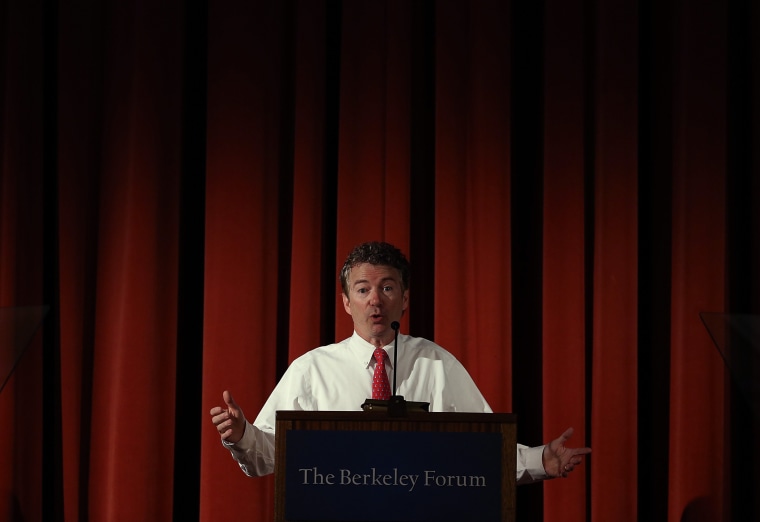Senator Rand Paul, Republican of Kentucky, said Wednesday that President Obama should be particularly wary of domestic spying, given the government's history of eavesdropping on civil rights leaders like the Rev. Dr. Martin Luther King Jr., injecting the issue of race into the contentious debate over surveillance. "I find it ironic that the first African-American president has without compunction allowed this vast exercise of raw power by the N.S.A.," Mr. Paul said in an address at the University of California, Berkeley. "Certainly J. Edgar Hoover's illegal spying on Martin Luther King and others in the civil rights movement should give us all pause," he said. "Now if President Obama were here, he would say he's not J. Edgar Hoover, which is certainly true. But power must be restrained because no one knows who will next hold that power."
A credible message, a less credible messenger
Rand Paul's message resonated with some at UC Berkeley last night, but there's an unresolved problem separating the message from the messenger.

Sen. Rand Paul (R-Ky.), to his credit, has prioritized outreach to voters not usually targeted by Republicans. And as the Kentucky Republican made clear yesterday in Berkeley, he also has a message that might resonate with these voters in ways the usual GOP message won't.
At UC Berkeley, where those with progressive values are the clear majority, hearing a red-state Republican senator break with his party and criticize the National Security State is very likely a pleasant change of pace. And for Paul, this is a point of critical importance: he sees himself in a unique position, because he, unlike his GOP colleagues, can actually receive applause in a setting like this one.
But as is often the case, there's a superficiality to Paul's standing. He thinks he can connect with these college students because he's opposed to NSA overreach. The senator also thinks he can credibly reference Martin Luther King, since the civil-rights icon was spied upon. Paul thinks he can embrace a "right to privacy" that most of his party insists does not exist in our constitutional system.
But what happens when the students at UC Berkeley scratch the surface?
What happens when they learn the senator referencing King also opposed the Civil Rights Act and the Fair Housing Act, then partnered with neo-Confederate who celebrates the birthday of Abraham Lincoln's assassin?
What happens when they learn the Republican who believes in a "right to privacy" also believes the government can and should be used to restrict women's reproductive rights and prohibit gay rights?
What happens when they learn Paul rejects national-security overreach, but told a national television audience last year that he's comfortable with the executive branch having the authority to use drones on Americans over U.S. soil if an administration perceives an "imminent threat"?
What happens when they learn the senator is happy to speak at UC Berkeley, but even happier to talk to Glenn Beck and WorldNetDaily, both of which he considers reliable sourecs of important insights on current events?
I'm perfectly comfortable conceding that Paul has a surface-level message on civil liberties that can resonate with audiences that have little in common with the Republican Party's traditional base.
But there's nevertheless an unresolved problem separating the message from the messenger.